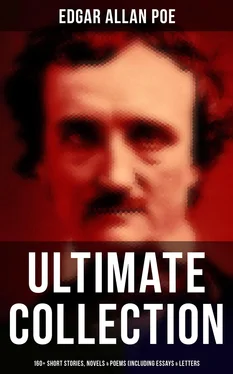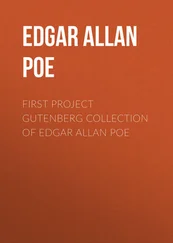The permission was obtained, and we proceeded at once to the Rue Morgue. This is one of those miserable thoroughfares which intervene between the Rue Richelieu and the Rue St. Roch. It was late in the afternoon when we reached it; as this quarter is at a great distance from that in which we resided. The house was readily found; for there were still many persons gazing up at the closed shutters, with an objectless curiosity, from the opposite side of the way. It was an ordinary Parisian house, with a gateway, on one side of which was a glazed watch-box, with a sliding way, on one si panel in the window, indicating a loge de concierge. Before going in we walked up the street, turned down an alley, and then, again turning, passed in the rear of the building-Dupin, meanwhile, examining the whole neighborhood, as well as the house, with a minuteness of attention for which I could see no possible object.
Retracing our steps, we came again to the front of the dwelling, rang, and, having shown our credentials, were admitted by the agents in charge. We went up stairs — into the chamber where the body of Mademoiselle L’Espanaye had been found, and where both the deceased still lay. The disorders of the room had, as usual, been suffered to exist. I saw nothing beyond what had been stated in the “Gazette des Tribunaux.” Dupin scrutinized every thing-not excepting the bodies of the victims. We then went into the other rooms, and into the yard; a gendarme accompanying us throughout. The examination occupied us until dark, when we took our departure. On our way home my companion stopped in for a moment at the office of one of the dally papers.
I have said that the whims of my friend were manifold, and that Fe les menageais:— for this phrase there is no English equivalent. It was his humor, now, to decline all conversation on the subject of the murder, until about noon the next day. He then asked me, suddenly, if I had observed any thing peculiar at the scene of the atrocity.
There was something in his manner of emphasizing the word “peculiar,” which caused me to shudder, without knowing why.
“No, nothing peculiar,” I said; “nothing more, at least, than we both saw stated in the paper.”
“The ‘Gazette,’” he replied, “has not entered, I fear, into the unusual horror of the thing. But dismiss the idle opinions of this print. It appears to me that this mystery is considered insoluble, for the very reason which should cause it to be regarded as easy of solution — I mean for the outre character of its features. The police are confounded by the seeming absence of motive — not for the murder itself — but for the atrocity of the murder. They are puzzled, too, by the seeming impossibility of reconciling the voices heard in contention, with the facts that no one was discovered up stairs but the assassinated Mademoiselle L’Espanaye, and that there were no means of egress without the notice of the party ascending. The wild disorder of the room; the corpse thrust, with the head downward, up the chimney; the frightful mutilation of the body of the old lady; these considerations with those just mentioned, and others which I need not mention, have sufficed to paralyze the powers, by putting completely at fault the boasted acumen, of the government agents. They have fallen into the gross but common error of confounding the unusual with the abstruse. But it is by these deviations from the plane of the ordinary, that reason feels its way, if at all, in its search for the true. In investigations such as we are now pursuing, it should not be so much asked ‘what has occurred,’ as ‘what has occurred that has never occurred before.’ In fact, the facility with which I shall arrive, or have arrived, at the solution of this mystery, is in the direct ratio of its apparent insolubility in the eyes of the police.”
I stared at the speaker in mute astonishment.
“I am now awaiting,” continued he, looking toward the door of our apartment —“I am now awaiting a person who, although perhaps not the perpetrator of these butcheries, must have been in some measure implicated in their perpetration. Of the worst portion of the crimes committed, it is probable that he is innocent. I hope that I am right in this supposition; for upon it I build my expectation of reading the entire riddle. I look for the man here — in this room — every moment. It is true that he may not arrive; but the probability is that he will. Should he come, it will be necessary to detain him. Here are pistols; and we both know how to use them when occasion demands their use.”
I took the pistols, scarcely knowing what I did, or believing what I heard, while Dupin went on, very much as if in a soliloquy. I have already spoken of his abstract manner at such times. His discourse was addressed to myself; but his voice, although by no means loud, had that intonation which is commonly employed in speaking to some one at a great distance. His eyes, vacant in expression, regarded only the wall.
“That the voices heard in contention,” he said, “by the party upon the stairs, were not the voices of the women themselves, was fully proved by the evidence. This relieves us of all doubt upon the question whether the old lady could have first destroyed the daughter, and afterward have committed suicide. I speak of this point chiefly for the sake of method; for the strength of Madame L’Espanaye would have been utterly unequal to the task of thrusting her daughter’s corpse up the chimney as it was found; and the nature of the wounds upon her own person entirely preclude the idea of self-destruction. Murder, then, has been committed by some third party; and the voices of this third party were those heard in contention. Let me now advert — not to the whole testimony respecting these voices — but to what was peculiar in that testimony. Did you observe anything peculiar about it?”
I remarked that, while all the witnesses agreed in supposing the gruff voice to be that of a Frenchman, there was much disagreement in regard to the shrill, or, as one individual termed it, the harsh voice.
“That was the evidence itself,” said Dupin, “but it was not the peculiarity of the evidence. You have observed nothing distinctive. Yet there was something to be observed. The witnesses, as you remark, agreed about the gruff voice; they were here unanimous. But in regard to the shrill voice, the peculiarity is not that they disagreed — but that, while an Italian, an Englishman, a Spaniard, a Hollander, and a Frenchman attempted to describe it, each one spoke of it as that of a foreigner. Each is sure that it was not the voice of one of his own countrymen. Each likens it — not to the voice of an individual of any nation with whose language he is conversant — but the converse. The Frenchman supposes it the voice of a Spaniard, and ‘might have distinguished some words had he been acquainted with the Spanish.’ The Dutchman maintains it to have been that of a Frenchman; but we find it stated that ‘not understanding French this witness was examined through an interpreter.’ The Englishman thinks it the voice of a German, and ‘does not understand German.’ The Spaniard ‘is sure’ that it was that of an Englishman, but ‘judges by the intonation’ altogether, ‘as he has no knowledge of the English.’ The Italian believes it the voice of a Russian, but ‘has never conversed with a native of Russia.’ A second Frenchman differs, moreover, with the first, and is positive that the voice was that of an Italian; but, not being cognizant of that tongue, is, like the Spaniard, ‘convinced by the intonation.’ Now, how strangely unusual must that voice have really been, about which such testimony as this could have been elicited! — in whose tones, even, denizens of the five great divisions of Europe could recognise nothing familiar! You will say that it might have been the voice of an Asiatic — of an African. Neither Asiatics nor Africans abound in Paris; but, without denying the inference, I will now merely call your attention to three points. The voice is termed by one witness ‘harsh rather than shrill.’ It is represented by two others to have been ‘quick and unequal’ No words — no sounds resembling words — were by any witness mentioned as distinguishable.
Читать дальше












